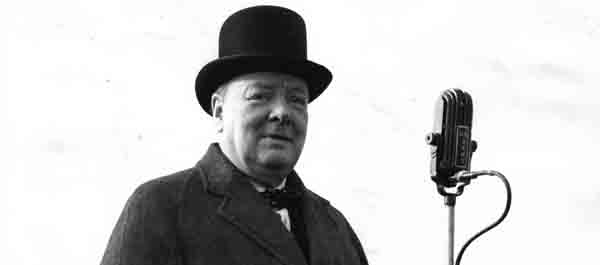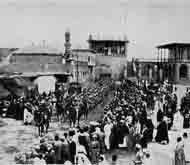What Would Churchill Have Done?

As an observer of the world as it exists at the end of 2011, I sometimes reminisce on the subject of leaders and what a difference someone like Winston Churchill might make in dealing with these difficult times.
Having spent nearly six years literally “living” with Churchill I often wonder, were he alive today, what he would have done and how he would have reacted to the wars America has chosen to fight.
The war in Iraq has finally ended after more than eight years, the loss of some 4,500 lives, a cost estimated by some to be as high as four trillion dollars, and a less than stable Middle East. We invaded Iraq in 2003 with our proverbial head in the clouds believing in “Veni, vidi, vici” and that we would quickly go home victorious, leaving behind a democratic Iraq. Instead, we created a quagmire the legacy of which has yet to be determined. Hawks like Sen. John McCain argue we should have left a residual force in Iraq.
{default}But the question remains: how long is long enough? We’ve been in Korea for over half a century and given the historical enmity between the Sunnis and Shiites, who have warred with one another for well over a thousand years, we might never leave Iraq.
The war may be over but as a recent article in the NY Times noted, “the heartbreak isn’t … Statistics are surely important, but they tell only part of the story about a decade of war. Behind each number there is a face. Behind each face there is heartbreak. You look at the faces of the dead staring straight ahead for the cameras, and you realize as if for the first time how achingly young they were, many not old enough to buy a drink legally, a few barely eligible to vote.” (Clyde Haberman, “The War Is Over, The Heartbreak Isn’t,” NY Times, December 15, 2011)
Churchill, I believe, would have been unlikely to have gone into Iraq in the first place. Indeed, his own experience with Iraq suggests he not only would have asked the hard questions about invading Iraq that were never asked by the Bush administration but would have concluded that waging a war there would have been sheer folly.
There is a precedent for this belief. In 1920, Churchill served in a dual capacity as the Secretary of State for War and the Secretary of State for Air, and from February 1921 to October 1922, as Britain’s Colonial Secretary. Among his areas of responsibility was the Middle East and a region and a new nation that the British created after World War I.
In 2006, columnist Joe Klein wrote in Time magazine about Churchill and Iraq. “’There is something very sinister to my mind in this Mesopotamian entanglement,’ Winston Churchill wrote his Prime Minister, David Lloyd George, in August 1920. ‘Week after week and month after month for a long time we shall have a continuance of this miserable, wasteful, sporadic warfare marked from time to time certainly by minor disasters and cuttings off of troops and agents, and very possibly attended by some very grave occurrence.’"
However, as Klein reminds us, “the British had created the problem, cobbling ‘Iraq’ from three disparate Ottoman provinces. They chose sides, picking the Sunni minority to run the country.” (“Even Churchill Couldn’t Figure out Iraq,” Time, July 30, 2006)
 It did not take Churchill long to grasp that Iraq was a losing proposition, and that at a time when Britain was still recovering from the enormous cost of World War I, investing some eight million pounds a year was not worth it. Yet, despite his objections and concerns the British stubbornly stayed there until 1932 before finally realizing that (in a time before oil was of such great strategic importance) it was time to cut its ties.
It did not take Churchill long to grasp that Iraq was a losing proposition, and that at a time when Britain was still recovering from the enormous cost of World War I, investing some eight million pounds a year was not worth it. Yet, despite his objections and concerns the British stubbornly stayed there until 1932 before finally realizing that (in a time before oil was of such great strategic importance) it was time to cut its ties.
What they created and left behind was a huge mistake: a Sunni minority in control of the new nation of Iraq that eventually resulted from 1979 to 2003 in Saddam Hussein’s reign of brutality and terror over the Shiite majority.
That unhappy result was none of Churchill’s doing: by the 1930s he was a backbencher in Parliament with no active role in governing Britain.
There are some eerie similarities between Churchill’s concerns over Iraq and the failure of his prime minister, David Lloyd George, to heed those concerns, and the blindness and ignorance displayed by the Bush administration, and their decision to invade Iraq without sufficient thought and consideration of the consequences. It was a mistake I believe that Churchill would not have made.
And while it is quite true that Churchill was often adamant, even obsessive, in pursuing his beliefs, and would have despised Saddam Hussein and all he stood for, it is equally true that he was not guilty of the arrogance and hubris that guided America’s decision to invade Iraq in 2003.
Much has been made of Churchill’s suggested use of poison gas in Iraq. The Middle East in the1920s was a mélange of conflict and rebellion that threatened stability and British interests in the wake of the dissolution of the Ottoman Empire. In 1920, the region was in a rebellion that was rapidly spreading. With British military assets spread thinly, there were insufficient troops available for Gen. Aylmer Haldane, the commander-in-chief of British forces in Mesopotamia to suppress the rebellion.
The greatly downsized post-World War I British army was spread too thin across the Empire and in dealing with the rebellion in Ireland. “We are at our wits’ end to find a single soldier,” Churchill wrote to Lloyd George on August 23, 1920. “It seems to me so gratuitous that after all the struggles of the war, just when we want to get together our slender military resources . . . we should be compelled to go on pouring armies and treasures into these thankless deserts.”
Churchill and Hugh Trenchard, the Chief of the Air Staff and the father of the concept of strategic bombing, discussed the employment of air power to help quell the revolt. Britain had a huge stock of poison gas left over from World War I and in late August 1920 Churchill wrote to Trenchard that he wanted the RAF to “certainly proceed with the experimental work on gas bombs, especially mustard gas, which would inflict punishment on recalcitrant natives without inflicting grave injury upon them.”
Churchill’s rationale was benign, and rather naïve, a belief that a sort of death-less form of warfare could be waged and “asphyxiating bombs calculated to cause disablement of some kind but not death” could be employed to quell the rebellious tribes. In recent years print and broadcast media have had a field day citing and speculating upon this regrettably worded missive that Churchill wanted the rebels killed and would have used poison gas to do it.
In this age of deplorable and often sensationalist journalism, most of the numerous television documentaries unfailingly point out Churchill’s proposed use of poison gas but conspicuously fail to mention that he did not want anyone killed as a result. In the end, this suggestion proved to be no more than one of the innumerable ideas that emanated from Churchill’s fertile mind on a daily basis.
Overall, a wealth of anecdotal and circumstantial evidence strongly suggests what Churchill would have done. Although Joe Klein argues that, “even Churchill couldn’t figure out Iraq,” it is equally true that Churchill would not have gone to war there without having explored in great detail every aspect of the pros and cons of invading Iraq. Moreover, unlike Bush and Rumsfeld in 2003, he also would have paid close attention to history and, I believe, come to a far different conclusion.
Happy New Year! And grateful thanks to the men and women of our Armed Forces for all they do.
Next month: a look at what Churchill might have thought about the war in Afghanistan.
Carlo D’Este is author of the acclaimed biographies Eisenhower: A Soldier’s Life, Patton: A Genius for War and Warlord: A Life of Winston Churchill at War, 1874-1945.


Gallipoli, Norway – Churchill was more than capable of promoting hair-brained military ventures. But he did champion the tank!